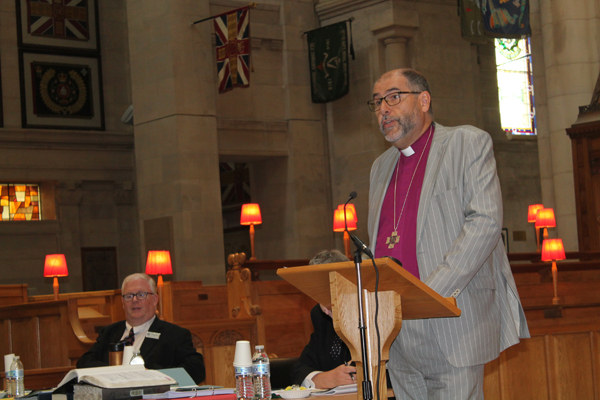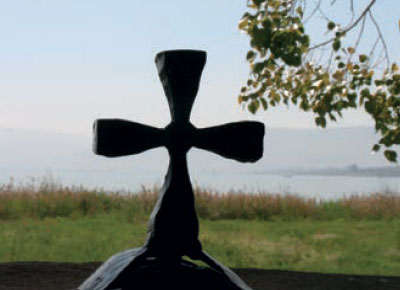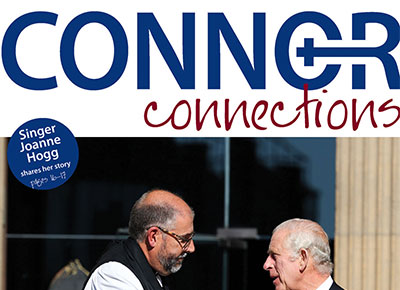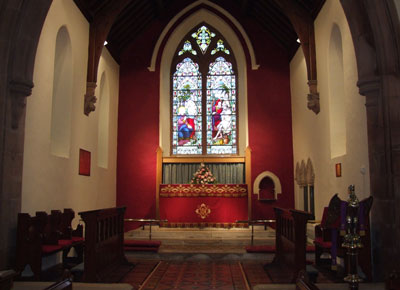Bishop speaks of ‘sense of joy’ as Synod meets in person

Bishop George Davison delivers his Presidential Address at Diocesan Synod in Belfast Cathedral on June 16.
In his presidential address to the first in-person diocesan synod since June 2019, the Bishop of Connor, the Rt Rev George Davison, said that he had called the meeting with ‘a genuine sense of joy.’
“Whilst we have managed to conduct our business in the intervening years using the technology available to us, there is nothing quite like meeting together,” Bishop George told the 250 or so Synod members gathered in St Anne’s Cathedral, Belfast, on Thursday June 16.
Acknowledging that the purpose of the meeting was to conduct business, the Bishop added: “Beyond the pages of our agenda today happens other important business – as friendships are renewed or we are introduced to someone new, conversations are shared or ideas are picked up; encouragement is given or problems are shared. And so it should be!
“For we are not simply an organisation gathering to transact business, but rather, as a small part of the body of Christ, we come together to support and encourage and help one another to overcome challenges and difficulties so that we may thrive and grow and work together for the good of the kingdom of God.”
The Bishop said he was immensely thankful for so much faithful work being done across the diocese by clergy and the lay leadership in parishes to shape parishes as places where people may come, find a welcome and be invited to discover who they are in Christ.
“Much of this work is done through the familiar activity of maintaining parish churches to provide opportunities for worship, fellowship activities and faith development. It’s work that happens week in and week out through the activity of clergy colleagues who work faithfully at their teaching and pastoral ministry; Select Vestries who maintain and care for buildings and provide resources for parish life; volunteers who give of their time and gifts to serve in ministries of music, organisation leadership, cleaning, flower-arranging and making tea – to name but a few.”
The Bishop spoke of the importance of reaching out to welcome those who are newly arrived in this country.
“When a congregation gathers gifts to give to ‘Baby Basics’ for those who are in need, or to an appeal to assist Ukrainian refugees, it says we recognise that we are called to see Christ in each person. It gladdens my heart when I see church families saying ‘welcome’ or ‘we care’ to those who are not identifiably part of their little church community.”
Bishop George spoke of the challenges and how parishes responded ‘amazingly’ in the face of lockdown and the pandemic. “People adapted, learned new skills, found imaginative ways of keeping connected and altered the way that they worked to meet a new situation,” he said.
“And yet I hear reports that, even as we begin to resume the normal patterns of church life again, congregations find that a portion of their previous worshippers have not yet returned.”
Other challenges, he said, included changing patterns of life, people moving away from the parishes where they used to belong and some churches finding themselves disconnected from the communities in which they are located.
The Bishop also spoke of challenges of finance and resources; of increasing burdens of ‘red-tape’ and compliance required by civil authorities; and the difficulty of finding the volunteers needed to do everything that needs done.
“As a diocese, I want us to nurture a sense of the support that we can be to one another. I frame it in that language because I think that it is vital that we understand the diocese as part of who we are, part of that wider network of relationships that connects and supports us as Christians.”
The Bishop highlighted some issues he said were significant in how parishes support one another in the diocese – sometimes the structures which have served a parish well in days gone need to be looked at and new ideas discussed and tried, he said.
“Across the diocese, but particularly in the Archdeaconry of Belfast, we have seen changes that have caused us to recognise that we need to try new things in order to grow and revitalise the church,” the Bishop told Synod.
“Under the leadership of the Rural Dean of Mid-Belfast, the Rev Tracey McRoberts, and with the co-operation and support of local clergy and parishes, steps are being taken towards a more collaborative way of working across the deanery.
“In South Belfast it has been gratifying to see how an initiative between All Saints Parish, University Street and St Nicholas Parish on the Lisburn Road is working well and bringing new people into the life of both congregations.
The Bishop continued: “I’m grateful to the Diocesan Council for approving my request for support for a new five-year partnership project between the diocese, the RCB and the parishes of St Aidan, St Mary Magdalene and St Simon with St Philip, Belfast.
“This support will see Archdeacon Forde leave his current role in the Chaplaincy at Queen’s University to work in a new role which supports the developing of Pioneer Ministries and facilitates reshaping for mission across the Archdeaconry and does so grounded in the particular context of the parishes of Inner South Belfast.”
The Bishop said this was ‘an exciting project.’
“I have no doubt that the experiences and learning which is done in the context of Belfast will quickly have application across the wider diocese and indeed the Church of Ireland.”
Another important issue is safeguarding relationships, Bishop George said, stressing that it is vitally important that those who engage in the life of our churches can do so safely.
“I’m very grateful to Archdeacon Stephen McBride for his lead in facilitating the support for parishes in this diocese around Safeguarding Trust and to our new Church of Ireland Safeguarding Officer for Northern Ireland, Mrs Gillian Taylor, for her advice and help. Gillian is new into the role, but is already demonstrating her ability to support and help us follow best practice in this area.”
Outlining the support that is being provided to parishes, the Bishop said: “It is in the interest of every leader and child in every parish and organisation that our procedures are carefully in place so that everyone is protected.”
The Bishop extended a welcome to the Rev Jacob Mercer (St Brigid’s, Mallusk) and the Rev Andrew Irwin (St Paul and St Barnabas) and expressed thanks to the Rev Philip Benson who left the Parish of Kilwaughter and Cairncastle with All Saint’s, Craigyhill, during the year to take up an incumbency in the Diocese of Derry. Philip also served as Chair of the Diocesan Youth Council.
He also extended thanks to Mr George Briggs for all his years of service on Diocesan Council, and to Dean Stephen Forde and Dean Sam Wright for their leadership of the two diocesan cathedrals and for their work this year in organising his ‘two contrasting but very meaningful’ services of installation.
Bishop George went on to thank Dean John Bond, Diocesan Curate, and the team of retired clergy and lay readers who provide for worship in vacant parishes; the Archdeacons; and the diocesan staff team
He concluded his address by saying it had been ‘a privilege to share in the life of this diocese as your bishop.’
He continued: “I have enjoyed the opportunity to begin to nurture my own relationship with many of you in that role and I look forward to what God will have for us together in the year that lies ahead. May we all serve Him and his church with faithfulness and joy.”
Read Bishop George’s ADDRESS in full.
© Copyright The Church of Ireland Diocese of Connor 2024 | Web Design by LD2.digital

























